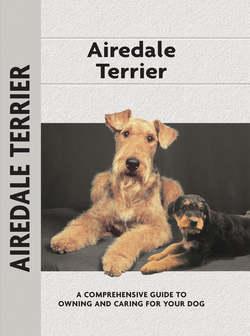Читать книгу Airedale Terrier - Bardi McLennan - Страница 16
На сайте Литреса книга снята с продажи.
THE UPS AND DOWNS OF THE KING OF TERRIERS
ОглавлениеOn the downside, the Airedale Terrier is what is called “mouthy,” that is, given to barking loudly and for long periods if not silenced, which is one reason that he should not be tied up. Any dog tied up outdoors will initiate a barking scenario that goes like this: Dog barks non-stop. Person shouts at dog to stop (in other words, barks back). Dog barks in response; person barks back, and so on and on, infuriating the two of them plus everyone in earshot. Airedales are social animals and need to be with the family, not left alone without anyone to follow about or to curl up beside. The remedy is a fenced area, regular outdoor play or nice (preferably long) walks.
The owner of an Airedale Terrier definitely needs a sense of humor; to be fair, firm and consistent; to reward every well-meaning effort with verbal praise and to be generous with treats for jobs well done. Remember always that if you cannot control your Airedale, he will gladly—and instantly—step in and control you. Terriers are all opportunists, always ready and able to move up in the family hierarchy and the Airedale probably tops the list in this skill. From the canine viewpoint, weak leaders cannot be trusted with the safety and survival of the pack, so when we say the Airedale is capable of taking on any job, that includes becoming “chairman of the board.” After all, he knows he’s the “King of Terriers!”
However, any dog with such innate versatility and intelligence is not one to submit easily to rote training. He is persistently distracted by sight, sound and scent, whereas most other breeds are governed by only one or two of these three drives. The owner needs to understand this diverse mental energy before beginning to train. Instructors used to contend that terriers in general did not make good pupils, going so far as to label them “terrible terriers” or “untrainable terriers.” Lately many enlightened trainers have come to realize it is not the terrier that’s the problem, but rather the method of teaching. Positive reinforcement (praise for the right response to a given command) works, whereas harsh verbal and physical corrections for failure do not. This affirmative reasoning extends also to training equipment, where the head collar has proven to be a far better choice for terriers than the chain choke collar.
HEART-HEALTHY
In this modern age of ever-improving cardio-care, no doctor or scientist can dispute the advantages of owning a dog to lower a person’s risk of heart disease. Studies have proven that petting a dog, walking a dog and grooming a dog all contribute to lowering your blood pressure. The simple routine of exercising your dog—going outside with the dog and walking, jogging or playing catch—is heart-healthy in and of itself. If you are normally less active than your physician thinks you should be, adopting a dog may be a smart option to improve your own quality of life as well as that of another creature.
The Airedale is instinctively a protector of his property and his family. His size and strong bark, which exposes large teeth in powerful jaws, make him a formidable foe to the unwary. Only if he senses the need to do so will he attack. Wherever the Airedale is used as a guard dog, he is trained for the job. One hears many more reports of Airedales’ saving toddlers from drowning or from darting into traffic than stories of Airedale attacks on intruders.
One day, two of my husband’s business associates came to the house to wait for him. Our Airedale greeted both men in a friendly, but formal, manner and then took a spot on the floor between where they were seated and where I sat. He appeared to have fallen asleep, but when one of the men partially rose out of his chair to reach an ashtray, the dog’s head was over his arm in a flash! No growl, no curled lip, no sign of aggression other than a look and body language that said it all: “Watch it! I’m on duty here.”
An Airedale Terrier with the right owner makes a happy and rewarding match.
The hereditary factor of gunshyness has been a source of arguments for years among those who hunt their dogs. Unreasonable shyness should be looked upon as a more serious breed fault than houndy ears, bad tail set or a soft coat, all of which may be faulty in show circles but perfectly acceptable in a lovable pet. A steady, friendly outgoing temperament, however, is of paramount importance in the family Airedale, as it should be in a show dog, working dog and obedience dog.
